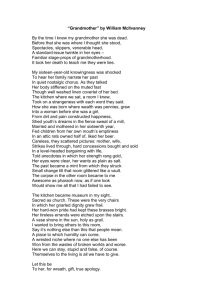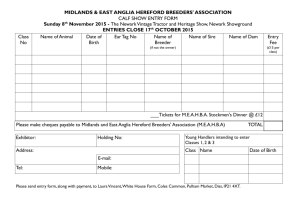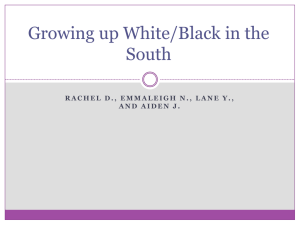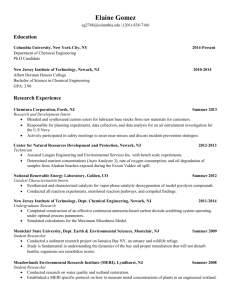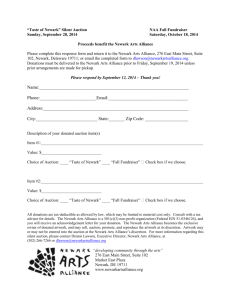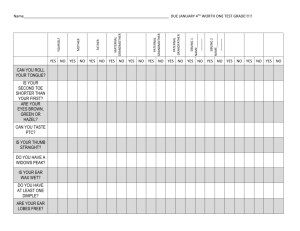Dear Benjamin, MORE GENEALOGY My paternal grandmother
advertisement
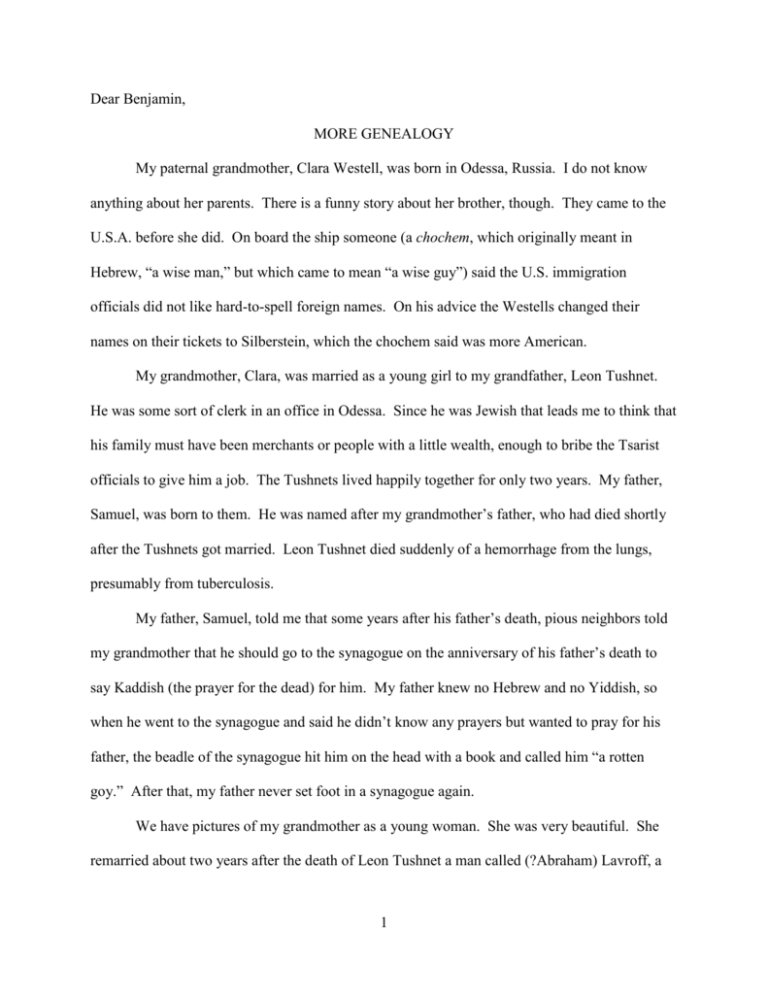
Dear Benjamin, MORE GENEALOGY My paternal grandmother, Clara Westell, was born in Odessa, Russia. I do not know anything about her parents. There is a funny story about her brother, though. They came to the U.S.A. before she did. On board the ship someone (a chochem, which originally meant in Hebrew, “a wise man,” but which came to mean “a wise guy”) said the U.S. immigration officials did not like hard-to-spell foreign names. On his advice the Westells changed their names on their tickets to Silberstein, which the chochem said was more American. My grandmother, Clara, was married as a young girl to my grandfather, Leon Tushnet. He was some sort of clerk in an office in Odessa. Since he was Jewish that leads me to think that his family must have been merchants or people with a little wealth, enough to bribe the Tsarist officials to give him a job. The Tushnets lived happily together for only two years. My father, Samuel, was born to them. He was named after my grandmother’s father, who had died shortly after the Tushnets got married. Leon Tushnet died suddenly of a hemorrhage from the lungs, presumably from tuberculosis. My father, Samuel, told me that some years after his father’s death, pious neighbors told my grandmother that he should go to the synagogue on the anniversary of his father’s death to say Kaddish (the prayer for the dead) for him. My father knew no Hebrew and no Yiddish, so when he went to the synagogue and said he didn’t know any prayers but wanted to pray for his father, the beadle of the synagogue hit him on the head with a book and called him “a rotten goy.” After that, my father never set foot in a synagogue again. We have pictures of my grandmother as a young woman. She was very beautiful. She remarried about two years after the death of Leon Tushnet a man called (?Abraham) Lavroff, a 1 carpenter. He was a drunkard. Clara Lavroff had then several children: Jacob, Dora, Rose, Lily, Elizabeth, and then when she was six months pregnant with Harry, her husband deserted her. She never heard from him again. It was very hard for her to get along in Odessa, a lone woman with so many children. Her brothers in America and a brother of Leon Tushnet sent money for fare for my father to come to America. He lived with the Tushnets in New York for a short while and worked as a house painter. He borrowed money and sent it to Odessa for fare. The Lavroff family then came to America. My uncle Harry was still an infant. My grandmother was very angry at the flat my father had rented for her. It was on the top floor of the six-story tenement on Attorney Street on New York’s Lower East Side. The flat was dark and dirty, with a toilet in the hall. Furthermore, all her neighbors were Jews and she could speak very little Yiddish, having lived all her life amidst Russians. (Side note – my grandmother learned to speak Yiddish but it was mixed with so many English words that everyone could understand her; she also used many Russian words, especially for foods that her grandchildren thought were Yiddish words. Example, the other children in the neighborhood would say they were having “Dempf Meat” which is pot roast but we had the same food and called in zharkoyeh.) My grandmother refused to unpack anything but the featherbeds and the samovar (which we still have). She sent my father and my Uncle Jake out to Newark to find rooms in a healthier atmosphere. Someone had told her that Newark was in the country. My father and my Uncle Jake rode the ferry to New Jersey and then the horse trolleys to Newark. They walked around all day looking for a flat. They both liked Newark. It had broad streets lined with big trees and was not crowded as New York was. On the advice of a bartender in a Russian saloon they found a flat on “The Hill,” a part of Springfield Avenue just above the 2 area where the German Jews lived. My grandmother liked the flat and the family moved to Newark. My grandmother was illiterate; she could read and write no language, but she was a smart woman. She lived to be 96 years old. She broke her hip when she was 89, and for the next seven years she was confined to a wheelchair, and then to bed. Her mind was clear up to the moment of her death. I liked her very much. (Next week: Romance) 3 Dear Benjamin – MORE GENEALOGY My grandmother (on my mother’s side) – your great-great-grandmother. Her name was Sarah Peppi Winkler. She was born in Hungary, and that’s all I know about her. She died of heart disease before I was born. My mother said she was a bitter woman, angry because she didn’t live as well in America as she did in Hungary. My maternal grandfather – your great-great-grandfather – was Marcus Schoenbrunn. He was born in Hungary. He went to school there in a separate school for Jews. He learned there how to read and write German and Hungarian. In those days, Hungary was part of the AustroHungarian Empire; Franz Josef was the Emperor. Marcus was very bright in school. We have in our sunparlor a framed certificate that was given to him for excellence in his studies. When he grew up he became an official of some sort on the railway system, which was owned by the government. While he was stationed in Homona (now a part of Czechoslovakia, but then part of Hungary), which you can see in the movie The Shop on Main Street, he met and married Sarah Winkler. The Schoenbrunns had four children born to them in Homona: Ilona (Lena), Olivia (Tillie), Anna, and the baby, Frieda. Then they emigrated to America. They traveled from Budapest to Trieste to Philadelphia, a very long and bad sea voyage in which everyone got sick. From Philadelphia they went straight to Newark, where Marcus had a cousin named Mollie Gelb. She had recently married an Austrian Jew who had become a citizen and had a job as clerk in the City Hall. In those days Newark was practically a German city, with German signs all over, just like there are Spanish signs now in New York City. German was even taught in the primary 4 grades as well as English. About a year after the Schoenbrunns [arrived in America] Leopold was born. Because he was an educated man, Marcus soon got a job as an insurance agent selling policies. Many Hungarian Jews came to Newark in that time because the Jews (who spoke German well) had no problem making themselves understood. Marcus was the organizer and first president of the Ungarische-Israelitische Kranken Unterstützunge Verein (which means Hungarian-Jewish Sick Benefit Association). This was a society to help sick members by paying them a few dollars a week; it also paid burial fees and provided a cemetery. The Society had a funny rule: no one could speak any language at its meetings other than German or English. That was because the members regarded Hungarian as a low class peasant language and Yiddish was a jargon unworthy to be spoken. Marcus Schoenbrunn died of cancer of the stomach six months after I was born. 5 Dear Benjamin and Michael – MORE FAMILY HISTORY My father, Samuel, became a housepainter and my Uncle Jake became his helper. There were no laws about child labor in those days. My father went to night school to learn to read and write English. He went for about two weeks. He learned to read very well but he never learned how to spell. He couldn’t understand why the language was so inconsistent, because Russian is a phonetic language in which the words are spelled the way they sound but English is not. Anyway, he became a great reader, especially of short stories of adventure. Scaffolds were used to paint the outsides of house. The scaffolds were attached to the tops of the houses by grappling hooks. One day one of the hooks gave way while my father and Uncle Jake were on the scaffold and they fell to the ground. Luckily, neither one was hurt. But my grandmother said there would be no more working on scaffolds. My Uncle Jake, who liked to draw, became a sign painter. My father, who was a very tall strong man, became a hatter. Hatting was the biggest industry in Newark then; Newark was the center of men’s hat making for the whole country. You can read about the technique of making felt hats in the encyclopedia. My father became a blocker of hats; that is, he pulled the raw shapes into crowns and brims. Men wore hats then more than they do now, and most of the hats were soft felt hats; derbies were beginning to go out of style. The only trouble with being a hatter was that the work was seasonal; sometimes there would be not work for weeks. My mother, Lena, also worked in a hat factory as an operator. She sewed the bindings on the edges of hats and sewed the sweat bands inside; this was done by machine. The Schoenbrunns and the Lavroffs both lived on Fairmount Avenue near Springfield Avenue in Newark. My father and my mother became acquainted and then went together for 6 about a year. There was opposition to their marriage. The Schoenbrunns thought marrying a Russian Jew was terrible; my grandmother Lavroff, on the other hand, worried that she would lose the pay my father brought home. Love conquers all. My father and mother were married early in 1908. They set up housekeeping in a flat in the same neighborhood. (Next time – a chronology of your grandfather’s life) 7 Dear Benjamin and Michael – MORE FAMILY HISTORY A few months after their marriage my parents moved to a flat on Rose Street, in Newark, in the same general neighborhood. I was born there on November 26, 1908. My mother made a joke about my birthday: “When he was born, the whole nation gave thanks.” I was born on Thanksgiving. My father continued to work as a hatter; my mother now became a dressmaker. She always had a flair for design and was good at sewing and draping. In those days there were no ready-made dresses for women; working class women made their own dresses, and richer women went to dressmakers. My mother soon built up a steady clientele of well-to-do women. She draped, sewed, and fitted the dresses at home. My brother Marcus was born in 1912; my sister Shirley in 1920. My family did a lot of moving around, and as a result I went to a number of different schools when I was a boy. I started kindergarten at Waverly Avenue School, first grade at Cleveland School, second grade at Camden St. School, and I entered the third grade at Miller St. School. I went to summer school there. Summer schools were something new then and almost all the children went because it was something to do. I was skipped from third to fifth grade, and then from fifth to seventh grade, and entered West Side School then. I graduated from grammar school there in 1921. That was the year intelligence tests were first given. I had an I.Q. score of 185. My mother was very ambitious for me to be a doctor, so I took the college preparatory course at Barringer High School in Newark. There was then a bad business depression and my father had no work for a long time. He finally got work as a ditch digger for the telephone 8 company but then he got sick. He had Buerger’s Disease, a closing of the arteries of the legs, very painful and disabling. He went to many doctors and went to the hospital several times, to no avail. At last his right leg had to be amputated above the knee. Now my mother had to support the family. Dressmaking had died out with the coming of ready-made dresses for women after World War I, so she worked as an operator on men’s hats. My father took over the household chores until the disease affected his left leg. From loans from the K.U.V., my mother bought a small dry-goods store in East Orange so she could stay home and care for him. There were 3 rooms behind the store. We barely eked out a living. In 1924, two months after my graduation from East Orange High School, my father had to have his left leg amputated above the knee. From then on he was confined to a wheelchair. My mother gave up the store because the income was too low; she went back to work. We moved back to Newark to a tenement house on Springfield Avenue. There the rooms were large enough for my father to get around in his wheelchair and his family, who lived in or around the same tenement, could help out when needed. I got a tuition scholarship to Washington Square College, part of New York University. Round-trip fare to New York was $6 a month by the Hudson Tubes. I had a dollar a week allowance until I got a job: 15¢ a day for a sandwich and milk, and a nickel a day for fare from the Tubes home; I walked to the Tubes in the morning. I took the pre-medical course at college and finished with a B.S. degree in 1927. At first I worked at a soda fountain in Newark on Saturdays and Sundays from 6A.M. to 6P.M., in a very bad neighborhood; for that I got $2 a day. The hat factories in Newark closed down. My mother had to work in New York. Between her fare and mine, the expense was too much, so the family moved to New York City: 9 first in Williamsburg, then in Bensonhurst, then in Flatbush, and then in the Bronx. In order to help support the family, my father learned how to make and did instill whiskey, which was illegal. 10 Dear Boys – Family History Continued I got a week-end job at Nedick’s, an orange drink stand, and in the summer I worked for the same company on Coney Island, which was then the big amusement park for New Yorkers. I got only a half-tuition scholarship for my second year in college, but a full tuition scholarship for the third year. At the end of my third year in college, I applied to three medical schools; only three because going away to school was beyond my financial abilities. Chances of getting into medical school were slight because of the quotas against Jews (and Italians). I applied to Columbia, Bellevue, and Long Island Medical College in Brooklyn. My first interview was at Columbia. After it was over, the Dean asked “Do you have any questions?” I replied, “Frankly speaking, will I be admitted?” He answered, “Frankly speaking, no.” I was admitted to Bellevue Hospital Medical College, and dropped the application to Long Island. I went to school from 9 to 5 through Friday and on Saturday I went from 9 to 1. I worked at Nedick’s from 6 to 1 A.M.; on Saturdays I worked from 1 to 1. That made a problem. In order to get to work on time I had to leave school at noon, meaning that I had to walk out of whatever class or laboratory was being held then. That annoyed the pathology teachers; they thought I was leaving early to go to football or other games. As a result pathology was the only course I got a D in. That queered my chances to get into A.O.A. [Alpha Omega Alpha], the honor medical fraternity. Tuition was only $500 a semester but even that was a great deal for us. My mother borrowed from Peter to pay Paul and I managed to pay the first two years, but in the middle of the third year (1930 during the Depression) I had no money to pay the tuition. I explained this to 11 the medical school office but they were uninterested in my problem and just suggested that then I quit school. One of the teachers suggested that I go to see Lucious N. Littauer, a millionaire who had a great interest in medicine. He loaned me $500 at 6% interest, to be paid back by the beginning of my fourth year. During the summer of that year my mother got sick and was operated on for hyperthyroidism; the family then moved back to Newark. During the summer and from then on I worked at Grant’s Lunch, a low-class establishment. One of the bosses there lent me the last year’s tuition at no interest. I finally graduated from medical school in 1931. In order to practice, one year of internship was required. I interned at the Newark Beth Israel Hospital, a beautiful new hospital that was beginning to have a severe financial problem because of the Depression. Very few of the private rooms were taken; the wards were overcrowded; there was no such thing as hospital insurance. I got $25 every three months plus room and board but I had to supply my own uniforms; that made just $100 a year as wages. I enjoyed my internship and learned a great deal in it, but it lasted only nine months. I was fired because I got into a fist fight with the head intern. They were glad to get rid of me; they gave me a certificate saying that I had been there the full year, so I could take the state exams and get my license to practice. I started practice in 1932 in Irvington, using the front rooms of a five-room apartment in a six-family house. My brother was married then, so the rest of the family lived behind the store, so to speak. Times were very hard. The rent was only $38 a month, but that was hard to pay. I bought an auto for $50 (a 1925 Pontiac). 12 Dear Boys – BIOGRAPHY The first year I was in practice I made a total of $732. That was really very little. The next year I made $1032. But after that my practice increased by leaps and bounds so that by the time I got married to your grandmother in 1939 I had $10,000 in the bank and was considered a rich man. My first car, a 1925 Pontiac, cost me $50, but in 1939 I already had a bright yellow Packard. The reason I was able to do so well was that I was a very good doctor. I was very outgoing and made friends easily. One of my best friends was a Dr. Earl Stage, one of my classmates. His father had been a doctor in Newark but had died the same year we graduated from medical school and Earl took over his practice. But he was as unbusy as I was, so we often visited back and forth during the afternoons. Earl was married to a girl whose family had been very wealthy but they lost all their money in the stock market. Her brother was now a sort of messenger boy in Wall Street. He told her that everybody on Wall Street (the financial district of New York) was reading a book that they raved about – John Strachey’s “Coming Struggle for Power.” She got the book and I read it after she was finished with it. It was about Socialism and presented the theory of Socialism so very logically that I was immediately convinced by it and became an ardent socialist. In those days the Socialist Party was a dying group; everybody who believed in Socialism was a Communist sympathizer. So was I. I began going to all sorts of meetings and learned a great deal. It was a very exciting time. Politics was in the air and young people were all politically minded. The United Front, Hitler, the Spanish Civil War, farmers’ revolts in Iowa, unemployment – everything had a political meaning. 13 The poet William Wordsworth wrote about the French Revolution and its effect on young Englishmen in 1789: Bliss was it in that dawn to be alive But to be young was very heaven. And that was the general feeling. I joined the Communist Party in 1936 and became very active in the professional unit. That unit got more and more members so that it broke up into a physicians’ unit, a dentists’ unit, and one for social workers, one for nurses, one for laboratory technicians, and one for assorted professions. Lots of things were very silly, too, in the Party. Everybody took a party name, for instance, “for secrecy,” even though we all knew each other. My name was E. Arnold. Meetings were held every Tuesday night. We discussed philosophy, politics, selling the Party newspaper, etc. One important thing for the doctors was the raising of money to carry on Party activities because the doctors were the (comparatively) richest members. Every year there was a fund-raising campaign. In January 1939 I went to a special meeting at Party headquarters, which was down on Broad St., Newark, about the campaign. There I saw a very beautiful girl with a beautiful voice, very quiet. She was the treasurer of another party unit. I asked who she was and was told that was Fern Bradley. I saw her a few times after that at meetings but when I asked about her, I was told he was already married. That was your grandmother. She was the most beautiful girl I have ever seen, and that includes movie actresses. When you come visiting us, I’ll show you some pictures from that time. In addition to beauty, she was very smart and had a good sense of humor. 14 She wasn’t married at all! I met her at a party to raise money for Spanish War Relief and found that out. That was in March, 1939. After that we went out together every week – to another party for a worthy cause! In June we decided we ought to get married but I had (continued next week) 15 Dear Boys – AND STILL MORE BIOGRAPHY A PROBLEM. I didn’t know how my parents would like the idea of me marrying a Gentile girl. (Remember – I knew your grandmother by the name of Fern Bradley.) I told your grandmother that and she laughed; we were on the way to meet he parents and Uncle Harry and Uncle Bernie. When I saw the name on the doorbell I began to laugh, too. So – on July 2, 1939, I married Fannie Brandchaft. At first we lived in the two rooms behind my office. (By that time my parents and Aunt Shirley had moved to an apartment next door.) About three months later we took the first floor of a two-family house on Osborne Terrace in Newark. I forgot to tell you, really forgot, about our honeymoon. After the wedding (in Grandma’s house) we drove to a hotel in New York. The next day we went to the World’s Fair. We saw practically nothing because it was so hot and we were so tired, so we went back to the hotel. The next day we left and went up to the hotel where Uncle Bernie was working as a waiter. It was called South Wind and was in the Catskill Mountains. We stayed there about a week. There was a strike of waiters and busboys at a big hotel down the street. Uncle Bernie organized a picket line and most of the guests at our hotel, being hot liberals, joined in. Well, we were all arrested and spent almost a whole night in jail, charged with inciting to riot, unlawful assembly, breaking the peace, trespass, and resisting arrest. We had to put up bail before were released. The trial was held a month later and all charges were dropped. That was the end of the honeymoon. We came home and I started to work again. 16 Your mother was our first child. She was really a beautiful baby and got more beautiful as the days went on. She was also very, very smart, even as a baby. She learned to speak very quickly. When she was one year old, she could say complete sentences. From that point on it is your mother’s story. I have finished with the genealogy of my side of the family. Next time we’ll have the Brandchaft family. 17 Dear Boys – MORE FAMILY HISTORY Joshua Waga – Felge ↓ Eva Waga born 1890, died 1971 ↔ Hershl Brandchaft – Rebecca ↓ Isadore Brandchaft born 1890, died 1953 ↔ ↓ Harry born 1910 Fannie born 1912 Bernard born 1916 Rebecca born 1920 Grandma’s grandmother, Feige, was married to Joshua Waga, who was a dealer in bones from which glue and fertilizer were made. They lived in Nowy Dwor, a small town about twenty miles from Warsaw in Poland. The Wagas had four children: three boys and a girl. Their family was strongly anti-religious, so Eva (your great-grandmother) attended a Polish school. Eva came to this country in 1905. She changed her last name to Wagner because her brother Sam had changed his to that name. The Brandchaft family also lived in Nowy Dwor. In those days many men felt their whole lives should be spent in the study of the Torah and the Talmud. They went to the House of Study and stayed there all day long while their wives worked to support them. Hershl Brandchaft was a lifelong student His wife had a stand in the marketplace of the town; there she sold produce she bought from the peasants. The Brandchafts had four children: Albert, Isadore, Esther, and Blanche. Albert emigrated to the United States in 1900; Isadore and Esther followed in 1905 and 1906, respectively; but Blanche emigrated to France in 1908. Your greatgrandfather, Isadore, was born in 1890; he died in 1953 as the result of a hit-run auto accident. Isadore Brandchaft also went to a Polish school; he was taught Hebrew, Yiddish, and religion by his father. When he got older he too joined the circle of unbelievers in Nowy Dwor. 18 He was [a] very smart man and learned a great deal by himself. He was a revolutionary, opposed to the Russian [regime]. 19 Dear Boys – MORE FAMILY HISTORY Your great-grandfather, Isadore Brandchaft, came to this country in 1905 with your greatgrandmother, Eva Wagner, with whom he was in love. They began living together in New York City. They both got jobs in the garment industry. Isadore took the New York State examinations and passed them and got a high school certificate which made him eligible for college. He worked during the day and at night he went to New York University. He had two years of college work. Eva’s brother, Sam, had a small store in Dover, New Jersey, a little town in the middle of a farming area. Eva persuaded Isadore to move to Dover. There he got a good job as a clerk in the Picatinny Arsenal working for the U.S. government. He had his application in for citizenship. During World War I he was allowed to work at the Arsenal but as soon as the war was over there was what was called the Red Scare. All foreigners were regarded as Russian Bolsheviks wanting to overthrow the government here. He was not yet a citizen so he was fired from his job. He became a citizen a year later. He opened a retail dry goods store in Dover but there were greater opportunities in Newark, so he moved there with his family. There he had a store for a while and then went into the jobbing business; that is, he bought large quantities of goods from big dealers and sold small quantities to retail stores. After that, he went in auctioneering. He bought up stocks from bankrupt stores or those going out of business and then sold the stocks to the highest bidder, people who owned retail stores. 20 The Brandchafts had four children: Harry, born in 1910 in New York City, and your grandmother, Fannie, born in 1912 in Dover; Bernard was born in 1916 and Rebecca in 1920, both also born in Dover. 21 Dear Boys – GRANDMOTHER FANNIE TUSHNET Your grandmother, Fannie Brandchaft, was born in Dover, New Jersey, in 1912. She attended the public schools there. When she was 12, she worked in a vegetable store weighing potatoes, etc. When she was 13, she commuted to Newark every Saturday to work in a millinery store for $3 a day. When the family finally moved to Newark, she went to South Side High School. At that time she had a pretty face but she was very very fat. She lost weight after she started college. She went to Long Island University in Brooklyn, traveling there from Newark every day. She was graduated in 1935. On weekends while she went to college she worked selling women’s shoes. After she got her degree she got a job in Hahne’s Department Store in Newark, selling shoes. She made $28 a week. At the end of the year she was promoted to be assistant buyer but her salary was not increased so she quit. She then worked for six months as a substitute teacher in Hillside High School in the English department. She hated teaching. As soon as she could she quit there. She then started working in the shoe department at Bamberger’s, a big store in Newark. She worked there until her marriage to me. Uncle Bernie was then a hot revolutionary, speaking at street corners trying to convert people to the cause of socialism as represented by the Communist Party. Under his influence, your grandmother joined the Communist Party. She was the treasurer of the unit and later became the financial secretary of the county Party. Your grandmother was one of the most beautiful women I have ever seen (and that does not exclude movie stars like Greta Garbo, Ingrid Bergman, and Catherine Deneuve). When you visit us you will see some pictures taken of her at that time and you will agree with me. She had 22 soft shiny light brown hair, an oval face, wonderful brown eyes with very large pupils, and beautifully shaped lips. Besides, she was intelligent. I didn’t understand at the time how such a beauty hadn’t been snapped up long ago but since then I have learned that beauties like her frighten a lot of men. I met her at a county Party meeting. The first time I saw her I said to myself: “That’s the girl I’d like to marry.” But someone (a story I’ll tell you when you’re older and I am very very old) told me that she was already married. I didn’t find out that wasn’t true until some time later. I think I already wrote to you about our marriage. Next time – your mother. 23

